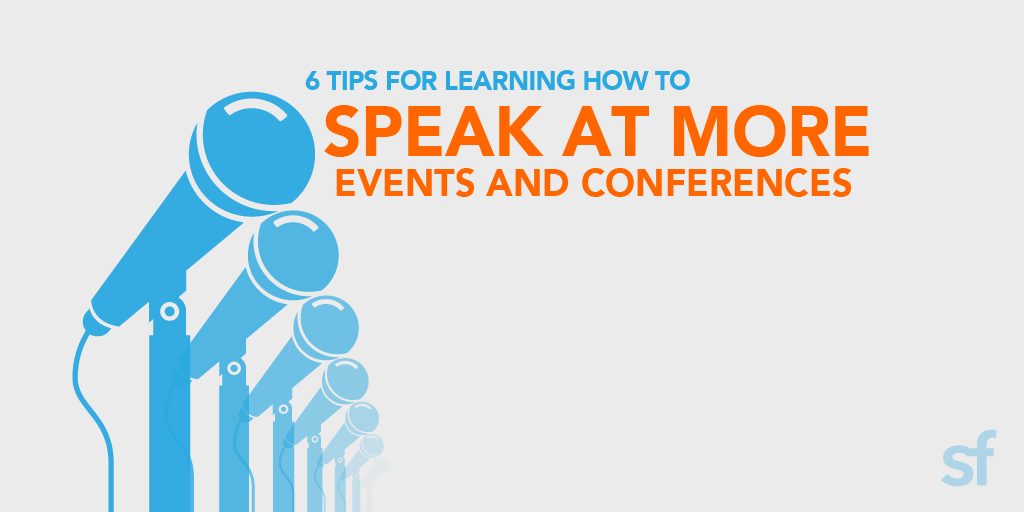Speaker selection is very important. I don’t think most events give this enough consideration.
I know this because, somehow, I still see panels of only whites dudes.
If you want to speak at a conference, start by understanding what they need. That’s the biggest thing that can help you.
Most conferences spend very little time researching speakers, screening speakers, or even broadly considering what a group of speakers will communicate from their stage.
For instance, here’s one of the important considerations when we onboard new speakers:
We’ve prioritized inclusion at Social Fresh since our first social media conference in 2008. I remember very clearly, I had confirmed a third of our speakers before I realized they were mostly white men. Inclusion has to be an intentional focus, otherwise you reflect whatever institutional bias currently exists in the system.
Ever since then we’ve put a focus on speaker inclusion.
Our success really took off when Social Fresh cofounder, Nicole D’Alonzo, setup our official speaker inclusion initiative. Since 2013, women have represented 50% or more of our speaker line up at every social media conference we’ve hosted.
It should be the norm. But it’s not.
One of our core Social Fresh values is equity. And if your company has a core value, you need to put metrics around it whenever possible.
Understand The Process
I am a keynote speaker and an event organizer. I work on both sides of the industry and I know both of these jobs can be challenging.
A common question I get is “how can I speak at your next conference?”
At Social Fresh we are typically looking for very specific presentations on niche topics. We cannot say yes to most folks.
It’s helpful to understand how a conference decides who they invite to speak, so I’m going to share our Social Fresh speaker selection process. Plus, some general speaker booking advice that has helped me get more speaking gigs and can help you get on the stage.
1. Algorithm
How do we decide who speaks at each conference? There’s more to this than I could explain in a blog post, but here’s a quick overview.
These are the key things we consider:
- Past speaker recommendations
- Speaker experience/stage presence
- Speaker confidence
- Unique opinion
- Topic expertise
- Brand name (and match for content themes)
- Inclusion (gender, race, industry, business size)
- History (past speakers with rave reviews)
- Misc. (each person is uniquely considered, so this is not an exhaustive list)
For every conference, we form a content committee that reviews a large pool of potential speakers. We review 5-10 times the number of speakers that we will ultimately invite on stage.
2. No Nominations
As a policy, Social Fresh does not take speaker submissions. This does not mean that you should never reach out to us. It is mostly a logistical challenge. We get hundreds of pitches each year, and as a very small team, we cannot review them all.
We do not have an open call for speakers. We do not have a form for submitting yourself to our content committee. We research the industry and curate a list of invites to send out.
Here are a few ways we might discover new speakers:
- Discovering people who have created a unique thought leader resources (blog post, video, etc)
- Past attendees, guest blog contributors, volunteers, affiliates, and partners
- Meeting speakers at other events
- Recommendations from past speakers
3. We Research A Lot
We take research seriously. We attend other conferences online and in person. We ask past Social Fresh speakers who they think is a rising star or a great speaker that we have not featured yet.
We listen to podcasts and consider our own podcast guests.
We make sure we are constantly connecting with and speaking with social media pros online and in person. LinkedIn is a great resource for this.
4. We Look For Brand Names
Attendees come to Social Fresh to hear from leading brands innovating in social media. They want memorable case studies and stories to bring back to their team. They need to be able to share these new learnings in a way their boss will recognize.
Also, this is not the only deciding factor by any means, but it’s an important piece of the puzzle. Attendees look for brand stories. Our audience wants to hear from brand names, so we consider this as part of our process.
We also include topic experts, agency/vendor speakers, and small to medium brands. Folks who have very deep expertise on a social media topic that will help our audience.
—-
That’s a really transparent and high level look at some of the pieces that make up our speaker process.
Now, if you want to speak at more conferences, Social Fresh or others, here’s a few recommendations to give yourself a better chance of getting on stage.
You don’t HAVE to do these things. But if you really want to increase your chances, read on.
1. Have A Personal Blog and Speaker Page
You don’t have to blog every week or every month. But you need a professional website that has information about you and links to your content around the web.
Have a specific page on your blog that is your “speaking page” for pitching yourself as a speaker.
That page should have a video of you speaking on stage. It should list your speaking experience, what topics you cover, testimonials, and photos of you at events.
You would not believe how many people are promoting themselves to speak, but don’t have any assets to support their pitch.
2. Have A Speaker Video or Reel
This does not have to be a highly produced reel of you speaking at 10 conferences. It should be a video excerpt of you speaking from at least one conference, on stage, about a relevant topic (relevant to the conference you’re pitching).
The video quality should be good, not shaky. The audio should be good. And it should give conference organizers a good idea of your stage presence.
90% of people that pitch Social Fresh to speak do not have this. So just think about the advantage it will give you.
3. Demonstrate What You Bring To The Conference
If you can demonstrate how your brand, audience, or topic will help generate ticket sales or offer a different take from their typical content, you increase your chances of getting on stage.
Some conferences are looking for very specific topics. Many corporations want someone with an exciting or inspiring stage presence. Other events want to hear about the future — predictions, thought leadership, etc.
Consider what the decision makers are looking for, what’s trending, and review last year’s content line-up to better understand how you can help.
Consider how you can stand out and offer unique value for that event.
4. Attend and Promote The Conference You Are Targeting
If you attend Social Fresh, if you write for the blog, if you tweet us and promote our content and our events, we will notice.
If you ask how you can help, we will notice.
Again, you do not HAVE to do this. But volunteering your time, your support, and getting to know the decision makers is one of the biggest things you can do, long-term, to get a leg up for any conference or event (or anything really).
It’s easier to pitch a conference when you’re part of the community — and you’ve supported the community in some way.
This might sound self serving, but it is the truth — and what we’ve done ourselves.
Relationships matter.
There’s no guarantee that you’ll get on stage, but again, relationships matter in most areas.
I still do this for my peers and fellow conference planners – whether it’s jumping in, at the very last minute, to present on stage or helping promote an upcoming event (it’s good to always have a deck ready!).
“It takes a village” really applies to conferences.
And even if this does not get you on stage, it will still be a huge plus for your professional network and contacts. I am proof of this.
5. Have Something To Say
This is the tactic that has gotten me the most speaking opportunities.
I’ve written hundreds of articles about social media and creativity.
Conference organizers will commonly ask me to speak because I wrote a certain article about a specific topic that fits their event/content goals.
Years ago, I got flown out to speak at a huge conference is Budapest, Hungary because of a blog post I published on brands using Foursquare.
Writing a book is a great way to show people what you have to say. Have a unique opinion and put it out there.
A quality blog post can help get the attention of an event organizer, as well.
Write about what you want to speak about. Make it unique. And put it out there in a lot of places.
6. Let People Know You Want to Speak
Ahhh, here we are. Full circle.
If you have done 1 through 4. You have a blog, a video, you are going to conferences and supporting conferences, and getting to know the organizers. Then you are ready to put the word out.
Email your friends. Share your speaking page.
Let people know what type of speaking you want to do. Let them know what topics you want to speak on and have a (unique) POV.
Email conferences. Link them to your speaker page, your video, your signature blog posts.
You can even advertise your speaker video to conference organizers on social networks.
You will not get what you do not ask for. But if you’ve done the prep, you might get that spot on stage.
Break a leg!
- Home page
- Content Marketing
- Digital Marketing Strategy
- Digital Marketing Strategy
- Digital Marketing Strategy
- PPC
- SEO
- Social maketing
- WordPress web development



